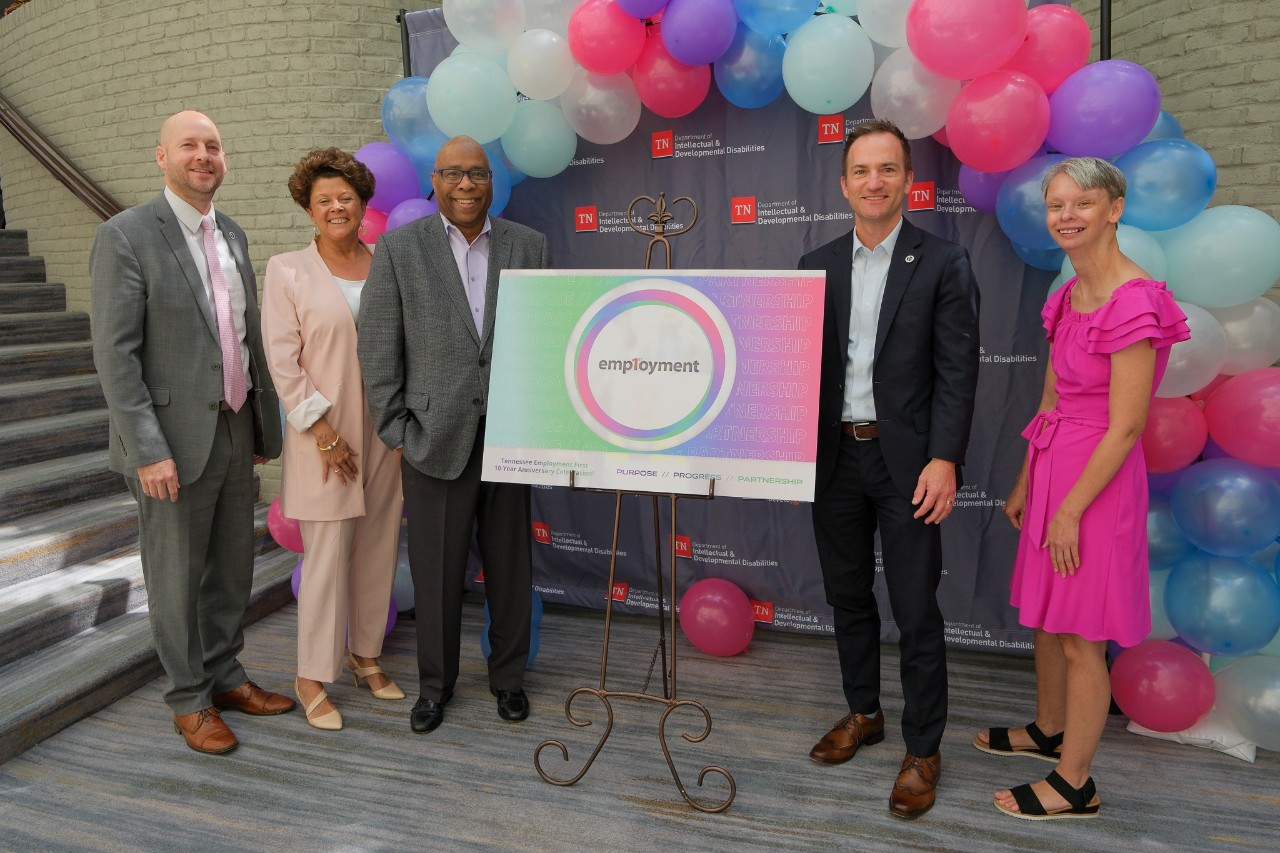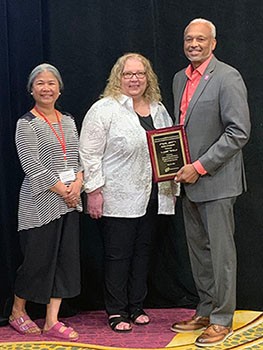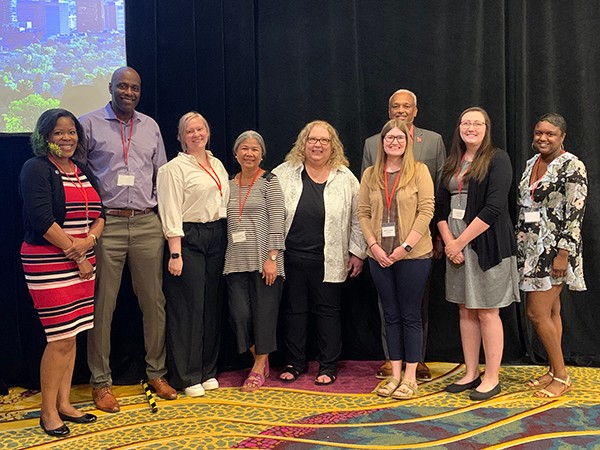News and Information
SAMHSA Releases New IPS Toolkit
SAMHSA developed this evidence-based toolkit to provide state administrators, communities, clinicians, policymakers, and others with the information and tools to implement IPS, an evidence-based Supported Employment, for persons with mental illness to find and keep employment. The IPS model of Supported Employment is grounded in research showing the transformative power of employment as a path to recovery. Through IPS, people with mental health conditions are empowered to find and sustain competitive, meaningful work, fostering a greater sense of purpose and community.
Tennessee Hosts, Supports and Represents at the International IPS Conference
The International IPS Learning Community chose Tennessee to host its Annual Meeting this year, and it was an impactful event. Representatives from at least seven countries and more than 30 US states met at the Nashville Airport Hilton to learn new applications, discuss emerging research, and celebrate the success of IPS implementation across the globe. During the conference, MHSAS Assistant Director of Employment and Wellness Stephanie Cooper received the IPS Facilitator Award for excellent performance in keeping the Tennessee learning community supported through data collection, TA, fidelity monitoring, and state government leadership. An employed member from Park Center shared about her recovery journey, from “rock bottom to, with support from her employment specialist, working a job she loves." Prior to the conference, the TN IPS team met with England, Alaska, and Norway’s IPS teams to discuss IPS implementation successes and opportunities for growth. AIM Center, CMI, Frontier Health, McNabb Center, Park Center, Pathways, TN Vocational Rehabilitation, TN IPS Benefits Counselors, TN IPS Trainers and the TDMHSAS Office of Wellness and Employment all had representatives at the conference to participate in sessions and some members of the TN team cofacilitated breakout sessions.
2024 Wellness Through Employment Conference
About 300 people gathered both in-person and virtually to celebrate the benefits of Wellness through Employment at an annual conference on September 26-27 hosted by the TDMHSAS Office of Wellness and Employment. Deputy Commissioner Matt Yancey delivered a kickoff keynote address, our partners at the Department of Human Services shared inspiring messages, and breakout sessions featured meaningful presentations on Individual Placement and Support (IPS) techniques, special populations including young adults, and lessons on improving or maintaining wellness. Special congratulations to TDMHSAS Peer Recovery Coordinator Michelle Webster who was honored with the Peggy Swarbrick Excellence in Service Award for her support of the Peer Wellness Initiative!

Welcome New IPS Trainer, Amanda Carr
Welcome our newest IPS Trainer to the team! Amanda Carr will be serving as an IPS Trainer for East Tennessee. She graduated from ETSU in 2013 with a Bachelor’s degree in Human Services and Early Childhood Development. She previously worked for Frontier Health for 11 years and served in many roles such as A&D IOP CM, School based CM, IPS Team Leader, and most recently as the IPS Employment Coordinator. She says she has always had a passion to help folks, both young and old, in the mental health field and encouraging them to have a successful road to recovery. Welcome, Amanda!
Implementing IPS in Rural Communities
Advancing State Policy Integration for Recovery and Employment (ASPIRE) has published a new policy brief focused on expanding IPS services to people in rural areas. Implementing Individual Placement and Support in Rural Communities: Barriers and Strategies describes barriers that program leaders face in implementing IPS in rural communities and the range of strategies used to eliminate these hurdles. The brief draws primarily on a qualitative study involving interviews with 27 IPS specialists in 15 states with successful IPS programs in rural communities.
Updated Tennessee IPS Onepager shows FY24 Stats and Successes
The department's IPS onepager has been updated for the new state fiscal year showing data from FY24 which ended on June 30, 2024. The revised document highlights the 1,611 people served by the 17 IPS providers in the year. That is a 25% increase year over year! The onepager also includes information about making the case for employment, benefits of employment, and average wages earned and hours worked by participants. Click this link or the image at right to download the onepager.
Tennessee Shines at International IPS Conference

Tennessee’s work to support the employment and educational goals of people living with mental health, substance use, and co-occurring disorders through Individual Placement and Support (IPS) supported employment was on full display at the International IPS Learning Community Annual Meeting in late May. At the conference, TDMHSAS Director of Employment and Wellness Mark Liverman received an award for leadership, and TN IPS Trainer Tiffanie Whitaker received an award for Excellence in IPS Training. Ruth Brock, formerly with the Department of Human Services Division of Vocational Rehabilitation, was also recognized for her role in getting IPS off the ground in Tennessee. The two day meeting held in Chicago was truly an international event with attendees from as far away as New Zealand sharing how the evidence-based model of IPS is supporting the independence and goals of people living with behavioral health challenges.
TDMHSAS Publishes 2024 Employment Works Report and Celebrates IPS at Event
Department leaders gathered with community providers to celebrate the accomplishments of everyone involved with the Individual Placement and Support (IPS) supported employment program in the last year. The FY23 accomplishments and success stories were featured in the 2024 Employment Works Report which was presented at the event at IPS provider Dismas House in Nashville on May 21. The event featured the success story of Bobby Anderson. With IPS and other supports from Dismas, Bobby went back to school and recently earned a Master's Certificate in Responsible Human Resource Management from Austin Peay State University. Bobby is using the supports from IPS to pursue higher education with a goal of working to help people like him after incarceration.
NAMI Ask the Expert: How Employment Supports Mental Health Recovery
View Archived Video of the Webinar at this Link
Employment provides many benefits to support recovery journeys, such as adding purpose and structure to one’s day. This archived webinar looks at how long-term employment can support mental health recovery. During this webinar, contributors covered topics such as:
- Research showing how employment improves quality and length of life
- The Individual Placement Support (IPS) model of supported employment
- The 8 Dimensions of Wellness
- Stories of personal recovery from individuals who benefited from supported employment
Close the Gap Onepager Highlights Tennessee Successes
Download the Onepager at this link.
This onepager produced by Tennessee's Employment First Task Force illustrates the employment gap between Tennesseans with disabilities and those with no disability. In the last ten years, the members of the Employment First Task Force have made great strides to close this gap, but there is still much work to do. This document highlights the effort and the bold goal for the future.
State Fiscal Year 23 Data and Achievements
Download the Presentation at this link.
This Powerpoint Presentation discusses the data collected by Tennessee's IPS Supported Employment teams during state fiscal year 2022-2023 (July 1, 2022 - June 30, 2023). In addition to numbers served, job attainment, and job retention statistics, this presentation also contains wage and demographic information.
Tennessee State Departments Celebrate a Decade of Purpose, Progress, and Partnership in Employing People with Disabilities
Several state agencies, disability service providers, and advocates are pausing to mark a decade of focused collaboration and success in expanding high-quality employment opportunities for people with disabilities in Tennessee. The establishment of Tennessee as an Employment First state in 2013 marked a milestone in the push for greater opportunities, and the collaboration among state agencies and community partners paved the way for substantial gains in the years that followed.
Read more in the news release at this link.
TDMHSAS joined with our Employment First partners for a 10 Year celebration on August 15. Pictured L to R: DIDD Commissioner Brad Turner, TDMHSAS Commissioner Marie Williams, DHS Commissioner Clarence Carter, TennCare Director Stephen Smith, Self-Advocate Clancey Hopper.


Tennessee Represents at National IPS Conference, Liverman Wins Award
Tennessee was well-represented at the 2023 International IPS Learning Community Annual Meeting, May 23 and 24, 2023 in Salt Lake City, Utah. Topic areas included personal recovery stories, new research findings from learning communities, mental health and vocational rehabilitation partnerships for IPS, serving individuals with justice involvement, and international updates. At the conference, TDMHSAS Director of Wellness and Employment Mark Liverman was surprised with an award for his work.
Pictured Below L to R: Tylesha McCray (VR Middle TN Area Director), William Otey (Statewide IPS Trainer), Stephanie Cooper (OWE Assistant Director), Ruth Brock (IPS National Trainer and Consultant), Sarah Swanson (IPSEC Director), Mikayla Moore (Statewide IPS Trainer), Tiffanie Whitaker (Statewide IPS Trainer Director), Key Hunt (Statewide IPS Trainer).

Wellness Through Employment 2023 Statewide Conference: May 11 and 12
The annual Wellness Through Employment Statewide Conference was held May 11 and 12, 2023. Attendees both in-person and virtual, received valuable insights and created connections with leaders in the field and peers from across the state. Highlighted presentations included the keynote presented by originators of the IPS model, Bob Drake and Debbie Becker. Additional presentation topics included applying IPS to people living with and recovering from substance use disorder, the Eight Dimensions of Wellness, and more. A special highlight was a panel discussion on the second day of the conference looking back at ten years of IPS in Tennessee with the men and women who brought the model to the Volunteer State.
You can view video of presentations from the conference at this link.
Click the photo gallery below for images from the conference and to view award winners.
IPS Services Spotlighted in Annual Expect Employment Report Presentation to Governor Lee (November 22, 2022)
TDMHSAS was proud to highlight the successes of IPS during the annual Expect Employment report presentation to Governor Bill Lee. This annual event is a highlight for the members of Tennessee's Employment First Task Force, and the report catalogs the task force members' progress toward increasing employment opportunities for Tennesseans with disabilities. This year's event was the first to focus on IPS. In state fiscal year 2022, Tennessee's IPS providers increased their successful job placements by 25%, and they increased long-term employment (90 days or more) by more than 60%!
Click this link or the image below to watch a video from the event.
State Fiscal Year 22 Data and Achievements
Download the Presentation at this link.
This Powerpoint Presentation discusses the data collected by Tennessee's IPS Supported Employment teams during state fiscal year 2021-2022 (July 1, 2021 - June 30, 2022). In addition to numbers served, job attainment, and job retention statistics, this presentation also contains wage and demographic information.
IPS Supported Employment Expansion featured in disability employment blog
Tennessee's big expansion to IPS Supported Employment Services was featured in the Tennessee Works "Rise to Work" blog in September 2022. The article submitted by Stephanie Cooper details the $900,000 state expansion and partnership with DHS-Vocational Rehabilitation which will nearly double capacity for IPS in Tennessee. Read the full blog at this link.
Welcome Stephanie Cooper, Assistant Director of Wellness and Employment!
As assistant director, Stephanie is responsible for the day-to-day administration of agency contracts for the provision of the Peer Wellness Initiative and Individual Placement and Support supported employment programs. She will also participate in annual contract development and processing, collection and analysis of program data and monitoring and approving contract spending. Stephanie comes to the Office of Wellness and Employment from Centerstone, where she had worked since 2014.
State Fiscal Year 21 Data and Achievements
Download the Presentation at this link.
This Powerpoint Presentation discusses the data collected by Tennessee's IPS Supported Employment teams during state fiscal year 2020-2021 (July 1, 2020 - June 30, 2021). In addition to numbers served, job attainment, and job retention statistics, this presentation also contains wage and demographic information.
COVID-19, Unemployment, and Behavioral Health Conditions: The Need for Supported Employment
Download the White Paper at this link.
Download presentation slides at this link.
The COVID-19 pandemic has exacerbated pre-existing behavioral health (mental health and substance use) disorders for many people and created new disorders for others. A robust evidence base shows that supported employment combines vocational and behavioral health supports to enable unemployed people with behavioral health conditions find appropriate, competitive, integrated employment. Many more U.S. citizens will need these services as the pandemic recedes and jobs open up.
2021 Expect Employment Report Presentation (October 14, 2021)
Download the report at this link.
Members of Tennessee's Employment First Task Force presented the 2021 edition of the Expect Employment report to Gov. Bill Lee during a ceremony at East Tennessee State University. The annual report contains highlights, accomplishments, and progress in the area of increasing employment for Tennesseans with disabilities.
2020 Expect Employment Report Presentation (November 2, 2020)
Download the report at this link.
Watch the full report presentation at this link.
Members of Tennessee's Employment First Task Force presented the 2020 edition of the Expect Employment report to Gov. Bill Lee. The annual report contains highlights, accomplishments, and progress in the area of increasing employment for Tennesseans with disabilities.
NAMI TN Facebook Live Event (October 5, 2020)
TDMHSAS Director of Wellness and Employment Mark Liverman and Debbie Becker from the IPS Employment Center joined Gabe Howard of NAMI TN to talk about IPS Supported Employment and how it is impacting the lives of people in Tennessee and around the world.
The Landscape with Naveh Eldar - Interview with Debbie Becker from the IPS Employment Center (March 29, 2020)
Listen to the podcast at this link
Deborah (Debbie) R. Becker, MEd, CRC - Senior Research Associate with Individual Placement and Support speaks about the gold-standard, evidence based method of supported employment for individuals with serious mental illness, which brought hard research into the supported employment world. Debbie speaks about early research, key parts of the method, and the international IPS learning community, which includes 24 states and six countries/regions outside of the United States.
Naveh Eldar has worked in the field of disability services for over 20 years and is considered a subject matter expert in the area of supported employment. He has supported individuals with severe psychiatric disabilities as the Director of Supported Employment with a Nashville based non-profit organization, and as a Tennessee statewide trainer of the Individual Placement and Support method of supported employment. In his current role with BlueCross BlueShield of Tennessee, Naveh supports providers across the state through the Employment and Community First CHOICES Medicaid program which supports individuals with intellectual and development disabilities.
TennesseeWorks Blog: Individual Placement and Support Helps Those with Mental Illness Get, Keep Jobs (February 13, 2020)
Generally, when we think about employment of people with disabilities, we think about people with physical disabilities or those who are blind or deaf. Working at the Vanderbilt Kennedy Center, much of our work is focused on people with intellectual and developmental disabilities. One group, however, is too often left out of the conversation. That group is people with mental illness.
The Governor’s Employment First Task Force continues to try to improve the employment landscape in Tennessee for people with disabilities, and that includes people with mental illness. As a part of that task force, I get to work with Mark Liverman, director of Wellness and Employment for the Tennessee Department of Mental Health and Substance Abuse Services. I asked Mark to discuss some of the issues and options for those with mental illness who are interested in getting and keeping a job. Mark was kind enough to answer my questions.
Question: Why is it important to address employment for people with mental illness?
Answer: Work is the best treatment we have for serious mental illness (i.e., people with schizophrenia spectrum disorder, bipolar, or depression). Two-thirds of people with serious mental illness want to work but only 15% are employed. They see work as an essential part of recovery. Being productive is a basic human need. Working can both be a way out of poverty and prevent entry into the disability system, such as Social Security Disability Income. Competitive employment has a positive impact on self-esteem, life satisfaction, and reducing symptoms, according to a 2014 study by Luciano, Bond, and Drake. The number of studies showing the effectiveness of Individual Placement and Support continues to grow. Individual Placement and Support is an employment service that helps more people with mental illness obtain employment than any other type of vocational program.
Read the full blog post at this link
News Release: TDMHSAS Continues State Leadership In Expanding Employment Opportunities For People With Disabilities (December 20, 2019)
The Tennessee Department of Mental Health and Substance Abuse Services (TDMHSAS) is continuing the state’s leadership in improving employment opportunities for people with disabilities through a new grant award.
Tennessee is one of 13 Capacity Building States identified for the Visionary Opportunities to Increase Competitive Employment (VOICE) program through the U.S. Department of Labor Office of Disability Employment Policy. The grant represents technical assistance which will flow to community behavioral health providers who use the Individual Placement and Support (IPS) Supported Employment model to connect people with severe mental illness to competitive integrated employment opportunities.

